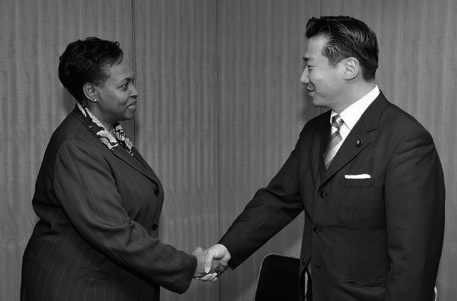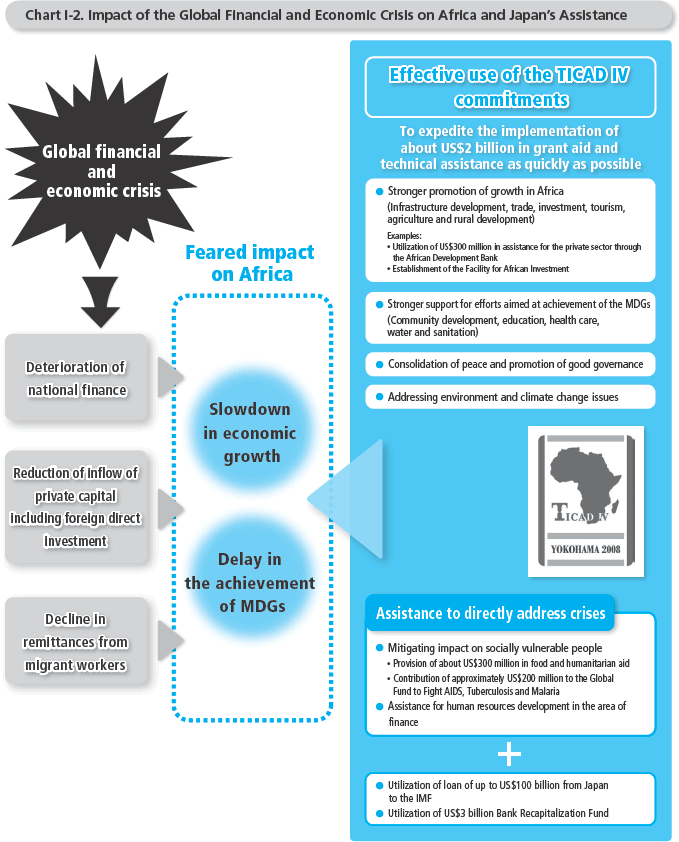Japan's Official Development Assistance White Paper 2009
Section 2 Steady Implementation of Assistance towards the Doubling of ODA to Africa
With the TICAD process at the cornerstone of its assistance to Africa, Japan has been actively supporting Africa's own efforts to address the continent's development challenges mainly based on the TICAD process whose principles are ownership by African countries and partnership of the international community.
At the Fourth Tokyo International Conference on African Development (TICAD IV) held in Yokohama in May 2008, lively discussion was held on the direction of future African development in order to support the recent positive trends in Africa and mobilize the knowledge and resources of the international community. The conference was held under the basic theme of "Towards a Vibrant Africa: Continent of Hope and Opportunity," and was focused on priorities of "Boosting Economic Growth," including infrastructure development as well as trade and investment promotion through improvements in the business climate, "Ensuring Human Security, including the Achievement of the MDGs and Consolidation of Peace and Good Governance," and "Addressing Environmental Issues and Climate Change." Japan announced that it would double its ODA to Africa and assist in doubling direct investment from Japanese private sector to Africa by 2012, provide ODA loans of up to US$4 billion in five years, and double grant and technical assistance to Africa.
The African continent has over the past five years recorded an average annual economic growth rate of 6%, aided by the economic reforms in the respective countries and the favorable climate of the external economy. However, this all completely changed with global financial and economic crisis after September 2008. First, countries with access to the international financial market such as Egypt, Nigeria, and South Africa were impacted by the credit crunch. Then, a downturn in the real economy owing to the worldwide fall in demand, plunge in primary commodity prices, and decline in foreign direct investment began to be seen across the continent. The International Monetary Fund (IMF) forecasted the real GDP growth rate of the African continent in 2009 to be 1.69% (as of October 1, 2009), and the World Bank predicted there will be delays in the achievement of the MDGs in all areas.
If Africa is profoundly affected by this crisis such that its economy, which has attained striking growth in recent years, experiences a slowdown while achievement of the MDGs suffers large setbacks, the efforts of donors, aid organizations, and the countries of Africa would end up with no effect. In order to avoid such a situation, the international community must offer its cooperation.
From the viewpoint above, at the TICAD Ministerial Follow-up Meeting (Note 4) held in Botswana in March 2009, the impact upon Africa of the current financial and economic crisis as well as measures to counteract it were discussed between donors, aid organizations and African countries. Japan announced that while its economy is impacted by the global financial and economic crisis, it will nevertheless fulfill the commitments made at TICAD IV without fail and will more vigorously assist Africa, which is also faced with the crisis. Furthermore, Japan pledged to expedite the implementation of approximately US$2 billion grant and technical assistance as quickly as possible. Recognizing that socially vulnerable people are the ones who will be most severely impacted as this crisis expands, Japan announced that in order to mitigate the impact it will provide food and humanitarian assistance of approximately US$300 million as well as disburse approximately US$200 million to the Global Fund to Fight AIDS, Tuberculosis and Malaria. The countries of Africa which attended this meeting were highly appreciative of the status of implementation of Japan's assistance as well as Japan's announcement of its determination to carry out its commitments made at TICAD IV. At the same time, participants of the meeting expressed the concern that under this economic crisis Africa's growth will suffer a slowdown while achievement of the MDGs will be delayed, as well as stressed the need for further assistance. At the G20 Summit on Financial Markets and the World Economy held in London in April 2009, Japan called for the scaling up assistance to Africa. Furthermore, at the G20 Pittsburgh Summit in September which Prime Minister Hatoyama attended, the need to strengthen assistance for the most vulnerable populations was confirmed.
At the 64th Session of the General Assembly of the UN in September 2009, Prime Minister Hatoyama announced that the new government intends to continue and strengthen the TICAD process. In October of that year, Foreign Minister Okada announced to the African Diplomatic Corps two fundamental principles of Japan's policy on Africa: 1) Providing assistance for development and growth of Africa; and 2) Contributing to peace and stability of Africa. At present, Japan is in the process of identifying and designing projects for each priority area, including Africa's infrastructure, agriculture, health, education, water and sanitation, environment and climate change, with a view to carrying out the commitments Japan made at TICAD IV. Japan has conducted more than 130 preparatory surveys in the countries of Africa and is making efforts towards the steady realization of these concrete assistance measures. Regarding ODA loans, Japan, with a view to reaching a new agreement on loans of up to US$4 billion over a five-year period, has been working to actively mobilize loans, including the expansion of loan recipient countries, while taking into consideration the persistence of debt and the specific needs of development in the respective countries.
With Japan's ODA to Africa in 2008 totaling approximately US$1.75 billion, which is more than the previous year by approximately US$670 million (61.7%), Japan is making progress to achieve the commitments announced at TICAD IV. Under the Hatoyama administration, Japan will continue to carry out the commitments announced at TICAD IV, including the commitments to double its ODA and provide assistance for doubling Japanese private investment to Africa by 2012. To this end, Japan will actively promote assistance to Africa, continuing to cooperate with donors and aid organizations such as the World Bank and African Development Bank, as well as NGOs, providing detailed assistance activities in Africa.
Notes:
(4) Approximately 430 people in total participated, including 68 countries (of which from Africa, 48 countries and 37 ministerial-level officials participated), 44 regional and international organizations, 5 NGOs, and the private sector.

State Secretary for Foreign Affairs Tetsuro Fukuyama meeting with Minister of Agriculture, Animal Industry and Fisheries Hope Ruhindi Mwesigye of the Republic of Uganda

